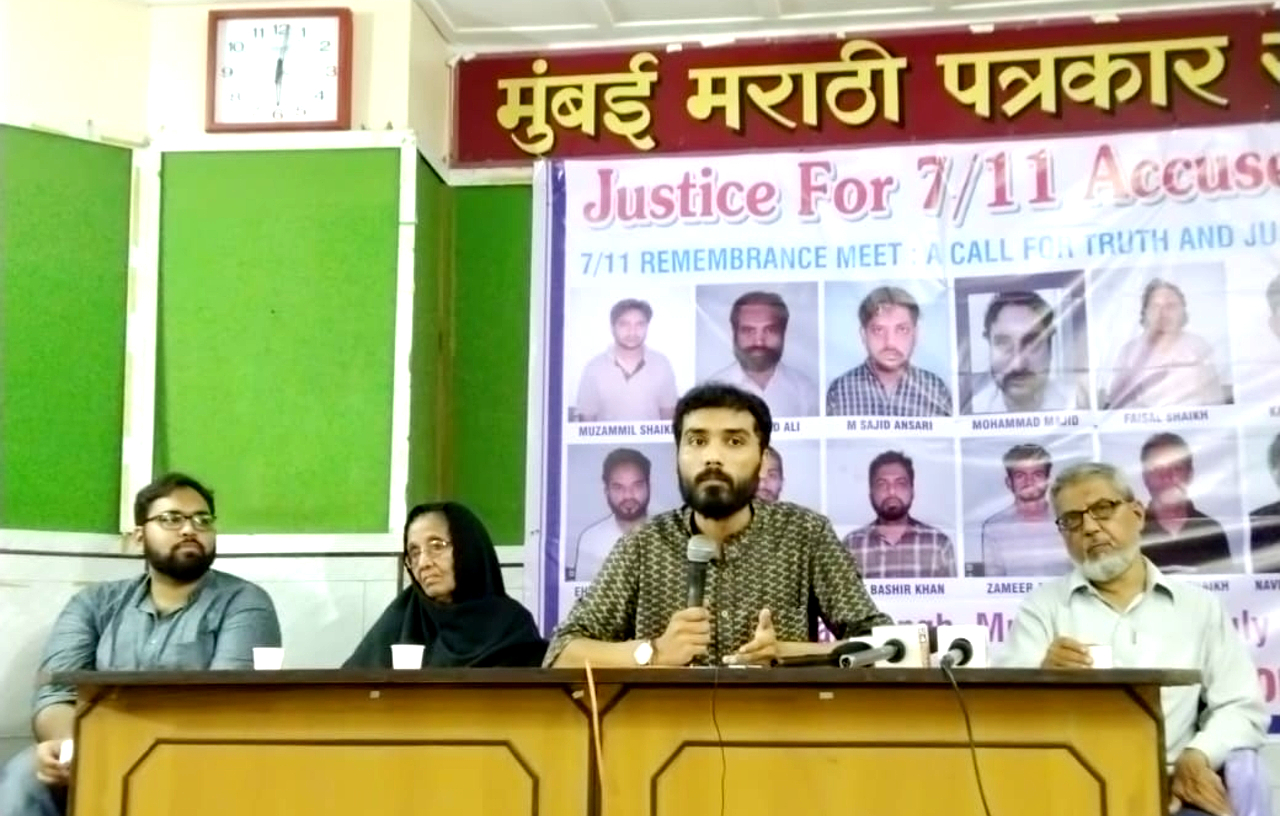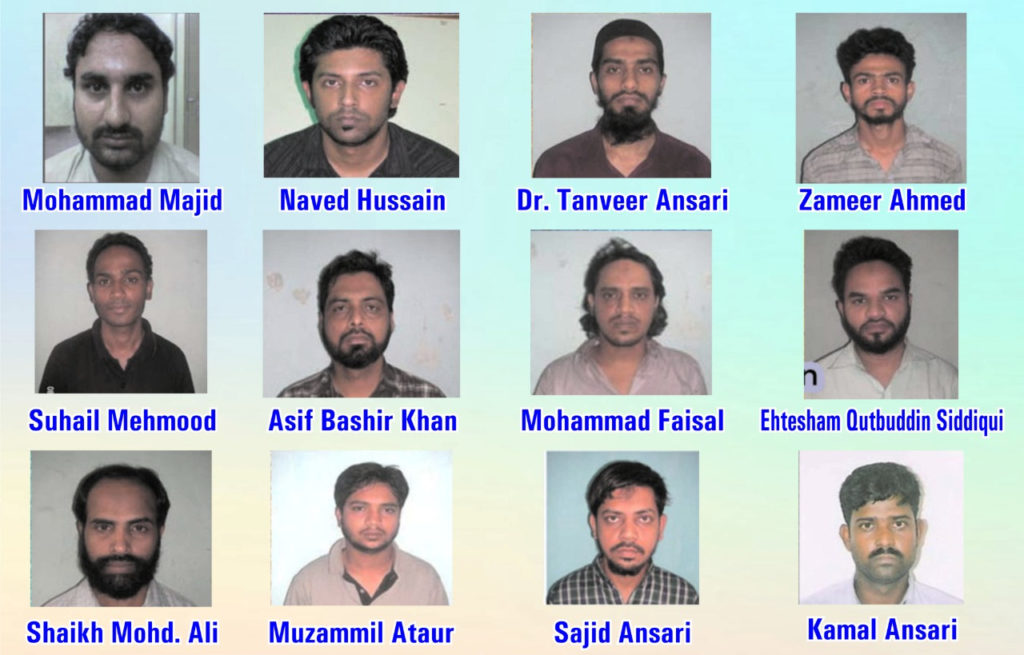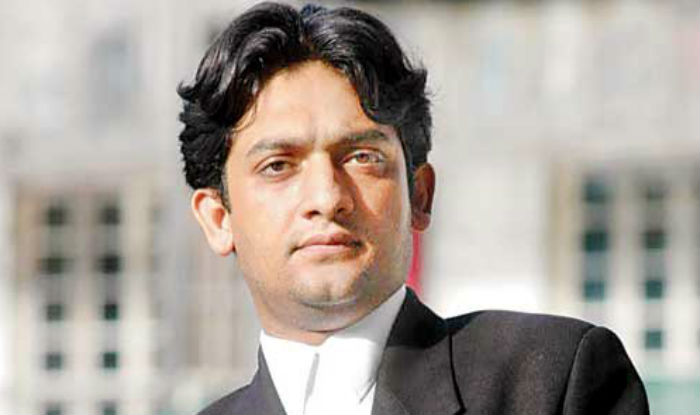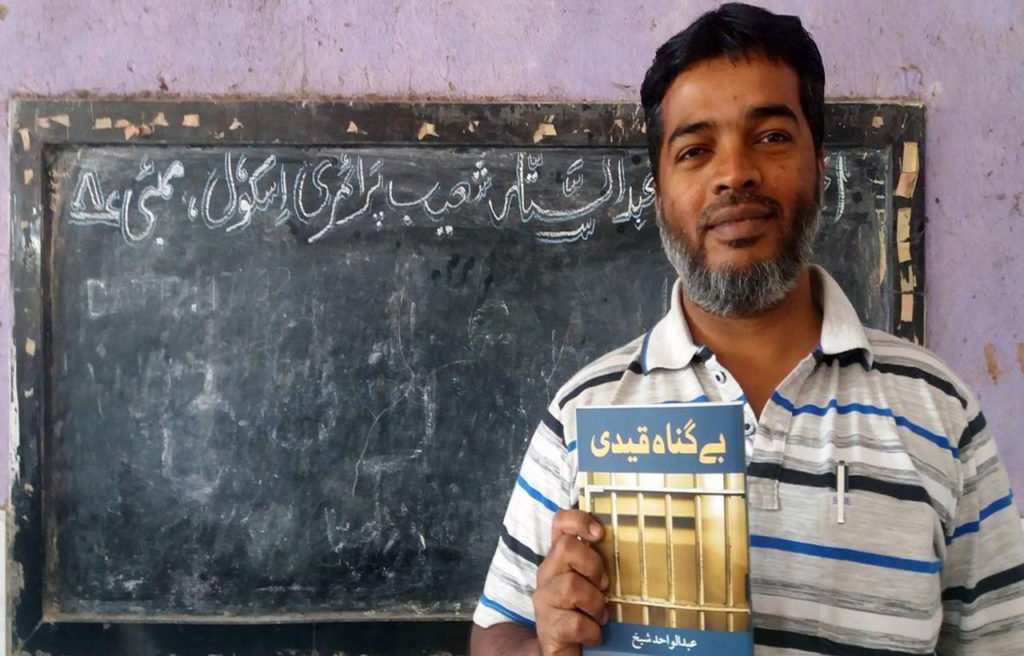A network of rights’ activists called Innocence Network India organised a remembrance meeting for victims of the 7/11 Mumbai train blast case yesterday at the Mumbai Marathi Patrakar Sangh. 13 years ago, on this day, a series of bomb blasts caused loss of more than 180 lives. The meeting was to pray for all the lives lost, to acknowledge the grief of the bereaved, and to countenance the damage that it has done to the city’s fabric, while calling for justice for the families of 13 accused who have been wrongfully prosecuted in the case by the Anti-Terrorism Squad (ATS). A GroundXero report.
“It is not just 13 men, but 13 families who are suffering”
Mrs. Shaheedunnisa, mother of Kamal Ahmed – one of the accused – addressed the press conference, relating how her innocent son was picked up from their house in Madhubani in Bihar. Kamal’s 13-year long incarceration has forced his five children into a life of destitution. His mother traveled all the way from Bihar to far off prisons but she was not allowed to meet her son. “I hope that the Indian government and [the] Bombay High Court will do justice to my son, and at least treat him like a human being,” she said. She alleged that her son has almost lost all sight in both eyes as a result of the physical torture and mental trauma he has been subjected to in the Nagpur prison. “It is not just 13 men [who have been imprisoned] but 13 families who are suffering – all of them are suffering from diseases and have severe mental and social trauma that will take years to overcome,” reminded social activist Khalid Siddiqui. “These past thirteen years and presumably many more years to come are causing such injustice that will never be undone,” he said.
On 11th July 2005, seven bombs, allegedly planted by Lashkar-e-Taiba operatives, went off in a span of 11 minutes on seven trains plying between Churchgate and Borivali – at Matunga Road, Mahim, Bandra, Khar Road, Jogeshwari, Borivali and Mira Road stations. They were planted in pressure cookers, which were placed in the overhead luggage racks of first class compartments. In 2015, 12 of the 13 arrested – including Kamal Ahmed – were declared guilty by the special MCOCA court, and five of them were sentenced to death. Each of the accused have denied any links with the LeT, or any connection with the blasts.
Earlier in January this year, Ataur Rahman Shaikh, father of two brothers accused in the 7/11 case – Faisal Shaikh and Muzammil Shaikh – died of a heart attack. His sons were not granted parole, neither to visit their dying father, nor to attend his subsequent funeral. Another accused Md. Majid’s wife Fiza is herself bed-ridden. Both her kidneys are failing and she has to undergo dialysis thrice a week. She has lost vision in one of her eyes and suffers from critically high blood pressure. The family has repeatedly applied for Majid’s parole so he may visit his ailing wife. However, his parole application was rejected based on reports filed by the Kolkata police, who claimed that Majid’s family does not have a “good reputation” in the area. “The police said these are hajis [euphemism for ‘religious extremists’]. For a hundred years our family has been living here! Everyone here knows who we are and what kind of people we are!” Fiza told GX earlier in an interview.
How long does it take to prove Innocence in Indian Courts? 25 years!
Mumtaz Mir, social activist and writer from Burhanpur, Madhya Pradesh, narrated his 25-year long ordeal to get acquittal in a Terrorist and Disruptive Activities (TADA) case. He shared the story of how a community meeting organised to plan a protest against the parading of a Muslim man tied to the bonnet of a police car led to fabrication of his case and his subsequent incarceration. Mir and his co-accused suffered horrific torture in police as well as judicial custody.
In those days false TADA cases were registered at will, to pick up Muslim youth from across the country. Mir and 10 others were picked up in 1994, accused of plotting bomb blasts across Maharashtra to “avenge the demolition of Babri Masjid”. “For weeks, they appeared on the front pages of newspapers, slammed as ‘terrorists’”, describes this Al Jazeera report. These 11 people branded as “terrorists” included not just writers like Mir, but also doctors, engineers, and PhDs. Though they were granted bail relatively soon, for five years the case had no movement. When some of the accused approached the Aurangabad bench of the Bombay High Court for quashing the charges, the police filed chargesheets within 48 hours. In 2007, a government-appointed review committee that was supposed to look into pending TADA cases directed the court to quash the case. But the court refused, stalling the case again. It took the Supreme Court 4 long years just to rule that this case be deposed within a year. Judges kept changing until the third judge concluded the case in a year and a half, acquitting all the accused and fining the public prosecutors. However, as a result of the ordeal, all of them lost their livelihood. Professional engineers were reduced to repairing home inverters for a living, doctors were reduced to small clinics that were boycotted by patients. Their names were prefixed popularly with the word ‘TADA’.
Media becomes the Court
Fawaz Shaheen, National Secretary of the Students’ Islamic Organisation and a researcher of terror cases, pointed out that it is not new that young men from a particular community are implicated, as an instrument of targeting the whole community. He described how the ATS circulated press clippings about ‘forensics approved’ call records data and narco analysis tests to sensationalise the media narrative, propagating stories that the 7/11 accused were in touch with the Lashkar-e-Toiba. These claims also helped the ATS get prolonged remand of the accused, which they used to torture and extract fabricated confessions.
Sharib Ali, one of the Founder Members of the Network, stressed that the Maharashtra Control of Organised Crime Act (MCOCA) wasn’t technically applicable in the 7/11 case, as the Unlawful Activities (Prevention) Act (UAPA) was already applied. But in this case, since the beginning, the standards of evidence and investigation procedures were changed. Confessions were allowed as admissible evidence, forensics were misused, and the investigative agencies had been holding multiple sets of accused for the same crime. MCOCA was applied only so that confessions given to the police – not acceptable in any law framework in India – could be presented as evidence.
Incidentally, the much touted ‘call records’ and narco analysis results circulated by the ATS across the media were not presented in court as evidence. In fact, quite ironically, when all the accused pleaded that their call records can prove their innocence, the ATS reported in the court that they never had such records with them. Similarly, narco analysis tests were never meant for the court, but for sensationalizing public opinion. This is despite the Supreme Court pointing out that these tests are not legally acceptable as evidence.
This is a pattern in various cases of terrorism where ‘evidence’ is sensationalized in the media to satisfy the public consciousness, and helps the investigative agencies get extended police custody which they use to torture and pressure the accused into signing fabricated confessional statements, while the actual culprits roam free. If part of the concern is that these thirteen men are not the real culprits, what is also worrying is that the real culprits behind these blasts are still at large.
Lawyers and Activists hunted down
In 2010, Shahid Azmi – a young and prolific lawyer (who was himself a victim of wrongful incarceration) – was gunned down by unknown assailants in his chambers. Adv. Azmi was fighting for the acquittal of the wrongly accused 7/11 convicts.
Wahid Shaikh, a human rights defender who was acquitted in the case four years back after 9 years of wrongful imprisonment and has since been actively campaigning for the release of his co-accused, is being continuously harassed and pressured by the police. Over the last one week, the police has visited his house several times, harassing his family in his absence. Wahid Sheikh’s harassment by the police because of his human rights activity has been reported to the National Human Rights Commission of India, but the harassment continues. Shaikh spoke of how he is a ‘khandaani’ Begunah Qaidi (innocent prisoner) because even his father, an employee of the Indian Railways, was incarcerated for 10 months during the Emergency under the Maintenance of Internal Security Act (MISA). Wahid Shaikh’s autobiographical account of his days in prison have been published as a book titled “Begunah Qaidi”.
On 28th February this year, the Bombay High Court admitted appeal petitions against conviction, filed by two of the 7/11 accused – Mohammad Majid Shafi and Mohammad Sajid Ansari. “The families of 12 wrongly convicted, and of Wahid Shaikh who was acquitted after 9 years of incarceration, have suffered unspeakable pain since the blasts. Their loss is no less than the grief of those who lost their loved ones in the blasts,” concluded the press release issued by the organisers of the meeting.




